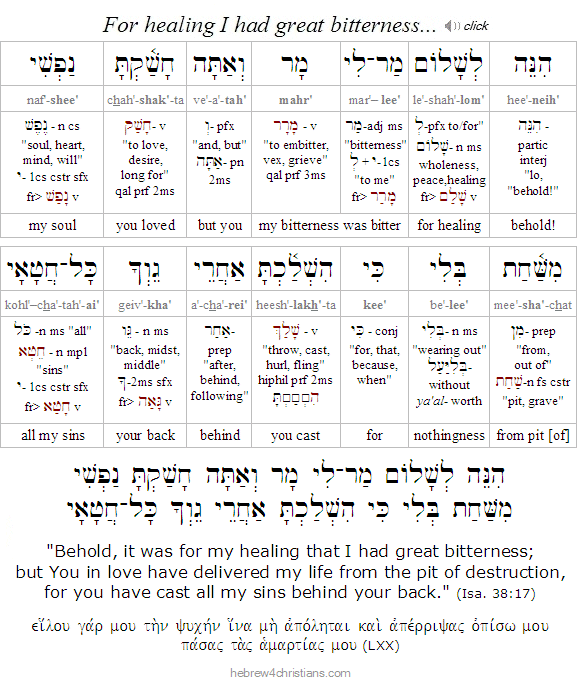|
The holiday of Yom Kippur (the Day of Atonement) is also known as Yom Kippurim in the Torah (ūÖūĢų╣ūØ ūøų╝ų┤ūżų╝ų╗ū©ų┤ūÖūØ, see Lev. 23:28), which can be read as Yom Ke-Purim, a 'day like Purim' (i.e., ūÖūĢų╣ūØ, "day" + ūøų╝ų░, "like" + ūżų╝ų╗ū©ų┤ūÖūØ, "purim"). Both Purim and Yom Kippur celebrate our deliverance from the great enemies of sin and death, and both holidays foreshadow the great purim (deliverance) we have in Yeshua our LORD.
ūöų┤ūĀų╝ųĄūö ū£ų░ū®ūüųĖū£ūĢų╣ūØ ū×ųĘū©ųŠū£ų┤ūÖ ū×ųĖū©
ūĢų░ūÉųĘū¬ų╝ųĖūö ūŚųĖū®ūüųĘū¦ų░ū¬ų╝ųĖ ūĀųĘūżų░ū®ūüų┤ūÖ ū×ų┤ū®ų╝ūüųĘūŚųĘū¬ ūæų╝ų░ū£ų┤ūÖ
ūøų╝ų┤ūÖ ūöų┤ū®ūüų░ū£ųĘūøų░ū¬ų╝ųĖ ūÉųĘūŚų▓ū©ųĄūÖ ūÆųĄūĢų░ūÜųĖ ūøų╝ųĖū£ųŠūŚų▓ūśųĖūÉųĖūÖ
hee┬Ęnei ┬Ę le┬Ęshah┬Ęlom ┬Ę mar-lee ┬Ę mahr
ve┬Ęa┬Ętah ┬Ę cha┬Ęshak'┬Ęta ┬Ę naf┬Ęshee ┬Ę mee┬Ęsha'┬Ęchat ┬Ę be┬Ęlee
kee ┬Ę heesh┬Ęlakh'┬Ęta ┬Ę a┬Ęcha┬Ęrei ┬Ę gev┬Ękha ┬Ę kol-cha┬Ęta┬Ęai

"Behold, for shalom - bitterness to me; bitterness;
but You have loved my soul from the pit of nothingness,
for You have cast all my sins behind Your back."
(Isa. 38:17)


In the verse quoted above, we read that God loves the soul "from the pit of nothingness," which pictures a loving father running to rescue his child from being swallowed alive by the earth (the Hebrew verb chashak (ūŚųĖū®ūüųĘū¦) suggests pulling someone up out of a hopeless pit). That God casts all our sins behind His back figuratively denotes oblivion ŌĆō and sins of the forgiven soul can are not brought to remembrance ever again. This is similar to the image given by Micah: "He will turn again, and have mercy on us: he will put away our iniquities: and he will cast all our sins into the bottom of the sea" (Micah 7:19).
The "ultimate" meaning of Purim is to be forgiven and accepted by God on account of the winning performance, the impeccable works of righteousness, and the victory of love over judgment secured by Yeshua the Messiah at the cross... Our deliverance depends not only on the substitutionary death of Yeshua as our kapparah (atonement), but also on the substitutionary life He lived (and still lives) on our behalf. Yeshua fulfills the Torah on our behalf. The cure for our lawlessness is not more laws but a deeper sense of God's grace given to us in Yeshua, who kept the law perfectly and ransomed us from its righteous judgment.... Because of Yeshua we have grace and peace (shalom) with God.
We must be careful not to confuse cause and effect in the realm of the spiritual. After the original transgression of Adam and Eve, death became the root problem of the human condition, so to speak, with indwelling sin as its fruit (i.e., the "works of the flesh"). It is this inherited "spiritual death" that causes sin. To focus on outward behavior without first of all dealing with the underlying problem of death is therefore a spiritual misstep. It is to clean the outside of the cup or to wash the outside of a tomb in a vain attempt to disguise the truth about our unclean and dead condition. The good news is not that God wants to make bad people good, but rather wants to make dead people alive... The cure for spiritual death is to be reborn and to partake of the resurrected life of Yeshua.
Following Yeshua is not a sort of "moral reformation" or self-improvement program to make us acceptable to God. Yeshua did not die on the cross so that we would become entangled in the old ways of being... No! He is Lord and Master and we find new life in His acts of deliverance done on our behalf and for our benefit. The temptation is always to go back to the law of sin and death (i.e., the principle of self-justification), but as Luther once said: "The sin underneath all our sins is the lie of the serpent that we cannot trust the love and grace of Christ and that we must take matters into our own hands."
"LORD, I need Thee every hour..." There never will be a time when we "get past" the need for God's grace given in Yeshua, since the only antidote to power of indwelling sin is the greater power of God's redeeming love within our hearts (1 John 3:8). The gospel is - not was - "the power of God for salvation (╬┤ßĮ╗╬Į╬▒╬╝╬╣Žé ╬Ė╬Ą╬┐ß┐” ß╝ÉŽāŽä╬╣╬Į ╬Ąß╝░Žé ŽāŽēŽä╬ĘŽüßĮĘ╬▒╬Į) for everyone who believes" (Rom. 1:16); it is an ongoing source of power for our lives... Our identity is made secure in the finished work of the Messiah - we trust in His strength, not our own; it is "Messiah in you" that is the hope of glory (Col. 1:27). Just as we are given a new life entirely by means of God's grace, so we are also sanctified as we walk in that newness of life... "As you received Yeshua the Messiah the LORD, so walk in Him" (Col. 2:6). The focus is always on Yeshua and His righteousness and obedience... Every step of the way is a miracle and a wonder when we walk "in Messiah."
We walk "in Him," that is, in His strength, in His power, in His love... we don't walk "to" Him or attempt to climb the "stairway to heaven." Yeshua is the Way, the Truth, and the Life. He is the Bridge - sha'ar hashamayim (ū®ūüųĘūóųĘū© ūöųĘū®ų╝ūüųĖū×ųĖūÖų┤ūØ) and the Divine Ladder upon whom the angels of God ascend and descend. We look to Him, not to ourselves for life. Because of the life of Yeshua within us, we are now able to bear fruit of the Holy Spirit as the Torah is written upon our hearts (Jer. 31:31). We are able to keep the Torah because the life of Yeshua empowers us to do so...
|



